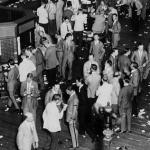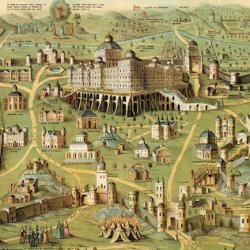Keith Bodner examines the story of Elisha and the bears in his Elisha’s Profile in the Book of Kings (58-9).
He observes that the boys’ insult “go up, you bald head” is ironic: “Elisha is mocked for his head, having just lost his head, Elijah (2:3). It is unclear whether those who taunt are aware of Elijah’s recent departure, but of course the reader appreciates the character differentiation: Elijah was well known because of ‘hair’ (2 Kings 1:8); now Elisha is identified for the opposite attribute.”
One of the problems if the text is to determine the age of the mocking “lads.” They are called “small young men” and then, in the next verse, “children.” Bodner points to the parallel in 1 Kings 12:1-15: “Rehoboam is faced with a crucial political decision. Either Rehoboam can listen to the counsel of those who stood before his father Solomon and acquiesce to the northern grievance, or he can heed the competing counsel of the young men who grew up with him. . . . Rehoboam begins his reign at 41 years of age according to 1 Kings 14:21, yet it is striking that those who grew up with him—and presumably the same age—are referred to as ‘children’ . . . Labeling Rehoboam’s colleagues as ‘children’ heaps derision on the immaturity and vulgarity of their counsel. With the boys of Bethel, it could be that a similar satirical use is intended.”
He recognizes that the location of of the incident in important: “After Jerusalem, Bethel is the most frequently mentioned Israelite city, and, as a spiritual center of the Omride regime, it is not surprising that the site is subject to scrutiny here. As we recall, this is not the first occasion of bereavement in the vicinity of Bethel, where ferocious creatures have a habit of turning up for judgment: in 1 Kings 13:24 a lion attacks the man of God from Judah when there is a conflict over respect for the prophetic word. Furthermore, this is not the last bereavement that will affect Bethel. The same verb ‘tear open’ . . . used for the bears is later used of the ravenous Hazael in 2 Kings 8:12, when Elisha forecasts that pregnant women in Israel will be ‘torn open.’ Like Hiel of Bethel, who also lost sons not so long ago, others will follow.”
He also links the 42 “boys” with the 42 members of the house of Ahab who are slaughtered in 2 Kings 10:14: “Elisha’s actions against the group . . . should be viewed as one component within the larger context of a protracted struggle that emanates from the cultic activity of Bethel and elsewhere under the aegis of royal sponsorship. That Elisha then proceeds to Carmel and on to Samaria as the chapter ends (2:25) amplifies the scope of the ideological battle, lately contested by Elijah and now poised to continue by this agent who has received the inheritance of a double portion of his master’s spirit.”












